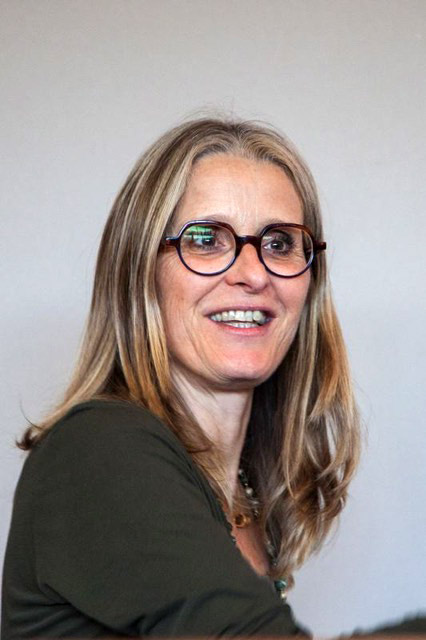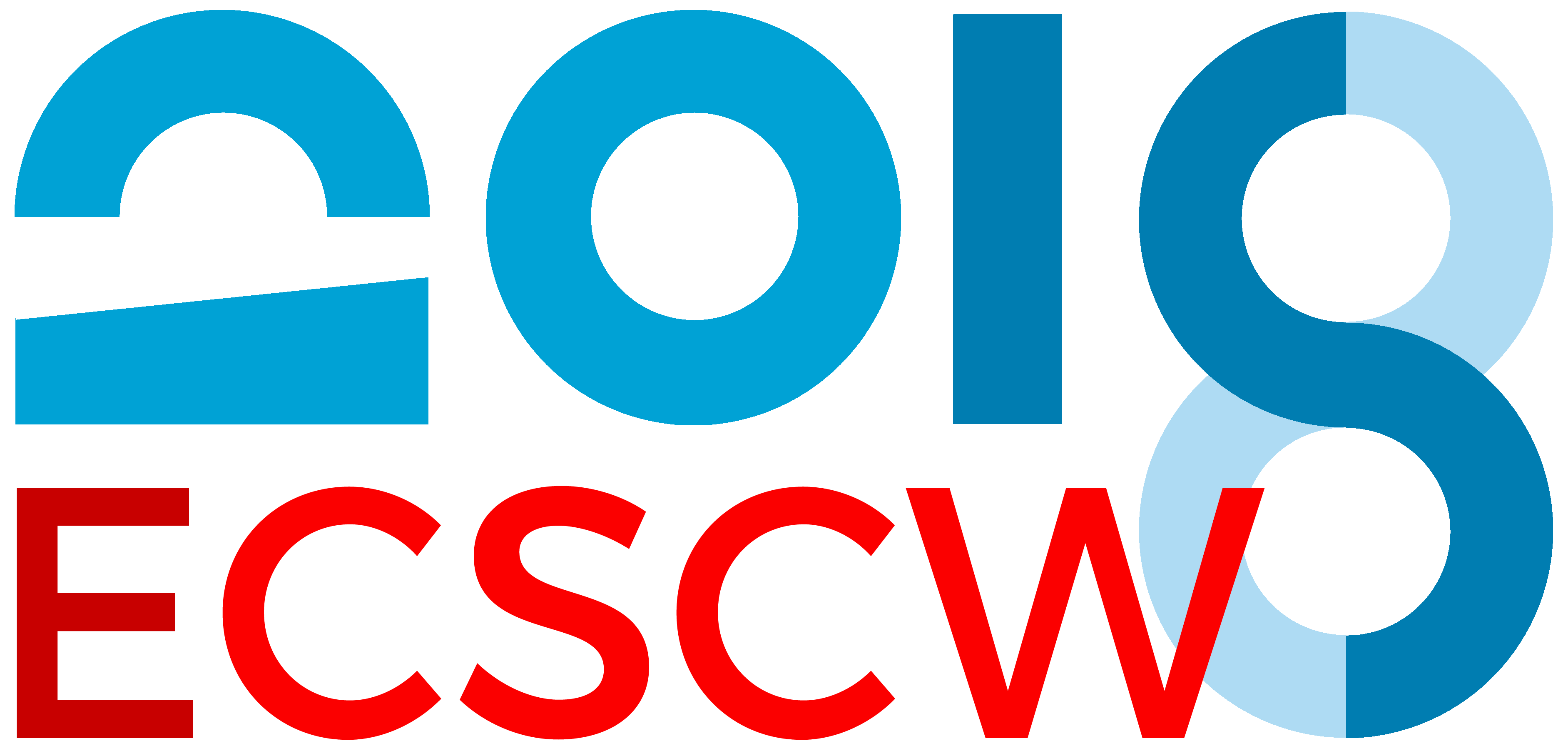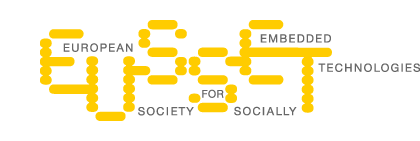Two Keynotes will be delivered at ECSCW 2018 by Valerie Issarny and by Antonio A. Casilli.
Valérie Issarny, Inria@SiliconValley
Valérie Issarny holds a “Director of research” position at Inria, the French institute for research in Information and Communication Science and Technologies, where she led the ARLES research team until 2013, investigating distributed software systems leveraging wirelessly networked devices, with a special emphasis on service-oriented systems.

Valérie in particular studies middleware solutions easing the development of distributed collaborative services, including mobile services deployed over smartphones and interacting with sensors and actuators. Since summer 2013, Valérie is the scientific coordinator of the Inria@SiliconValley International Lab promoting and fostering collaboration between Inria and California universities. She is also coordinating the Inria CityLab program dedicated to smart cities and promoting citizen engagement; the program is developed in collaboration with CITRIS at University of California Berkeley and targets urban-scale experiment in Paris and California cities. Ongoing projects include Ambiciti on urban pollution monitoring through participatory sensing and crowd sourcing, and SocialBus on a middleware solution enabling interactions across social media to support democratic assembly and collective actions.
USNB – Enabling Universal Online Social Interactions
This talk presents joint work with Rafael Angarita and Nikolaos Georgantas
Online social network services (OSNS) have become an integral part of our daily lives. At the same time, the aggressive market competition has led to the emergence of multiple competing siloed OSNSs that cannot interoperate. As a consequence, people face the burden of creating and managing multiple OSNS accounts, and learning how to use them, to stay connected. In this talk, I will present our research toward relieving users from such a burden through the introduction of a global online social network that allows people to interact using their favorite (siloed) OSNS. Our research builds upon our background on middleware-based interoperability solutions, which need to be revisited for the specific context of « social interoperability ».
The first part of the talk will concentrate on our contributions so far, which span: (1) a formal model to reason about the OSNS interoperability problem; (2) an implementation of a “Universal OSNS” that builds upon the proposed model; and (3) a preliminary experimental evaluation involving 50 participants where results show that people are positive about the solution as they are able to reach out a larger community of users.
The talk will then conclude with ongoing and future research directions. They all relate to the broad and ambitious question of how software systems may enable participatory democracy, that is, the participation of citizens in democratic assembly, action, and governance.
Antonio A. Casilli, Telecommunication College of the Paris Institute of Technology (Télécom ParisTech), France
Antonio Casilli is an associate professor of Digital Humanities at the Telecommunication College of the Paris Institute of Technology (Télécom ParisTech) and a research fellow in sociology at the School for Advanced Studies in Social Sciences (EHESS, Paris). He is also a member of the Interdisciplinary Institute on Innovation (i3, a unit of the French CNRS), and a faculty fellow at the Nexa Center for Internet & Society at the Polytechnic University of Turin.
His main research foci are computer-mediated communication, labor, and politics. He initiated the French academic and public debate on digital labor and, in 2017, was among the co-founders of the European Network on Digital Labor (ENDL). Concomitantly, he launched the research program DiPLab (Digital Platform Labor), bringing together unions, platforms, state agencies to explore the links between automation, platform organizations and the future of work.

Casilli has advised the French Digital Council (CNNum) on matters touching on work and the impact of automation on employment (National Strategy on Artificial Intelligence, 2017; Report on the New Trajectories of Employment, 2016), and has served as an expert for the French Council of State (Report on Digital Technologies and Fundamental Rights, 2014).
Among his books: “Qu’est-ce que le digital labor?” [What is digital labor?], INA, 2015 (with D. Cardon); “Against the hypothesis of the ‘end of privacy’”, Springer, 2014 (with P. Tubaro & Y. Sarabi); “Les Liaisons numériques” [Digital relationships], Seuil, 2010. A longtime regular commentator on French national radio, his work has been featured in international media (Le Monde, Repubblica, Arte, BBC, RTS, CBC, CNN, Times of India, La Vanguardia).
Who works your data? Responsible AI to address trust and privacy in micro-work regulation.
Responsible AI aims to explore the social, ethical, and legal concerns arising from automated systems and the application of machine learning techniques in an increasing number of domains. Within this field, a growing body of research gets to grips with labor regulation. Since recent developments in economic theory have questioned the displacement effects of AI on employment (i.e. the “robots will steal our jobs” fallacy), the debate revolves around AI-induced work –most notably on the actual amount of visible and invisible human labor demanded to produce automated solutions, and how it can comply with legal and ethical principles of fairness and transparency.
A specific form of AI-driven human activity is the emerging phenomenon of micro-work. Specialized crowd-sourcing platforms (such as Amazon Mechanical Turk and Crowdflower) enable the massive allocation of standardized micro-tasks to myriad non-specialized providers in return for remunerations which can be as low as one or two cents. The functioning of smart equipment, driverless cars and virtual assistants is predicated on huge amounts of data that need human work to be annotated, labelled, qualified, refined, or augmented. In addition to preparing data to calibrate and train algorithms, micro-work is needed to evaluate the outcomes of machine learning models. Sometimes, micro-work disguises residual tasks of larger data processing operations that could be automated, but that unskilled humans can still solve more cheaply and accurately than computers.
Micro-work is mainly performed by millions of individuals in low- and middle-income countries in South Asia and Africa, in line with the emergence of global supply chains that are typical of contemporary economies and rely on massive outsourcing and off-shoring of business processes. Specific concerns arise not only in terms of working conditions and rights, but also in relation to the transfer of data across borders where specific data regulation applies – paradoxically at a time when European GDPR enters into force. AI’s worldwide “micro-workforce” introduces distinctive, often overlooked societal risks, such as issues of confidentiality of corporate information and privacy of personal data handled by hidden overseas workers to train future automated solutions. Non-disclosure of number of workers, of actual type of tasks, of contractual and financial frameworks of these services introduces a gap in our knowledge of this peculiar type of “data work”. This gap needs to be addressed in view of possible consequences not only on automation, but also on privacy.




